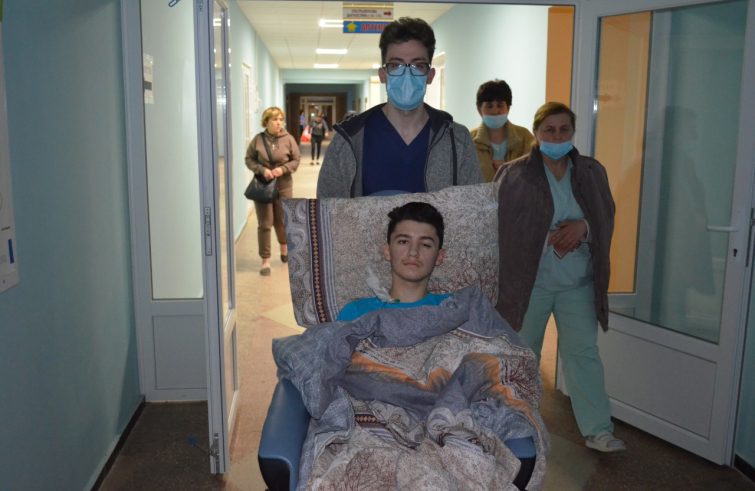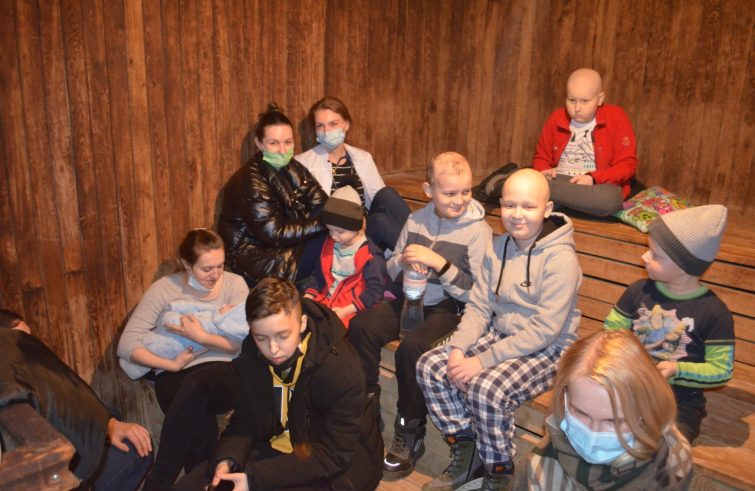
Damiano Rizzi, president of the Soleterre Foundation, a nonprofit organisation that has been actively assisting children cancer patients in Ukraine, has just left for Lviv and its immediate surroundings to identify the hospitals that are still functioning. SIR interviewed him shortly before his departure.
What did your commitment involve before the war?
Before the war we carried out our activity in Kyiv, at the National Cancer Institute, a hospital treating solid tumours, and at the Paediatric Neurosurgery Unit, which treats tumours of the central nervous system, and in the western area, in Lviv, where we have been working for several years at the health facility for the treatment of leukaemia.
Each of these hospitals treats an average of 50 children, that is 150 children every month, amounting to a total treatment capacity of about 1,500 children a year.
In addition to this, Soleterre purchases medicines, medical equipment, provides medical training, and has set up residential homes to ensure that children, including those from the east of the country, can receive treatment in Kyiv. Medical training has been carried out with the involvement of Italian hospitals, first and foremost the San Matteo Polyclinic in Pavia, with which we are currently developing a transplant centre at the Lviv hospital.
The war has brought most of these activities to a halt, because
the Paediatric Oncology Unit in Kyiv has been closed, we have evacuated the patients together with the medical staff, and we are working to open a new hospital in the centre of the country, to ensure that surgery can continue.
Sadly, surgery is now being performed not only on paediatric cancer patients but also on war-wounded children. The number of children treated is usually assessed over a five-year period. In Italy, approximately 11,000 of children with cancer have been treated over the past five years, compared to 4,000 in Ukraine. There are children who have to be hospitalised, children who are admitted to the hospital for treatment protocols, and therefore may stay in residential homes or in their own homes, and then there are children who have recovered after five years. When the war broke out, the children who could be discharged were sent home, it was too dangerous for them to remain there. The Paediatric Oncology Unit in Kyiv is on the sixth floor – a major risk in case of bombing. Only the most critical patients stayed, but we managed to evacuate them. When I say “we”, I refer to a joint effort involving Soleterre and other international organisations: we tracked down 1,000, we evacuated 700, some 80 children are in Italy at the moment. Soleterre Foundation was the first to evacuate patients.
The first eighteen patients who arrived had travelled 800 kilometres by train, bus, covering the last stretch on foot. These were critically ill children, some of whom had undergone surgery a few days earlier, who could not or should not have gone through all this if not for the desperation of having to flee the bombs.
In spite of the fatigue of the journey, they resumed treatment and some have been discharged. We managed to find homes for them where they receive psychological support, cultural mediation, food and accommodation. Soleterre has been working in cooperation with the San Matteo University Hospital in Pavia, where we have a residence hosting six families. It is very important for the families to be together, as they have been through a very difficult group experience. Staying together helps them to engage in mutual support activity. In addition to the emotional strain of a child with cancer, they have fled from a war, stayed in a bunker for five days with their fathers and, in some cases, with siblings and grandparents who remained in Ukraine. Some of them have come from war-torn areas such as Mariupol, Kyiv and Irpin.
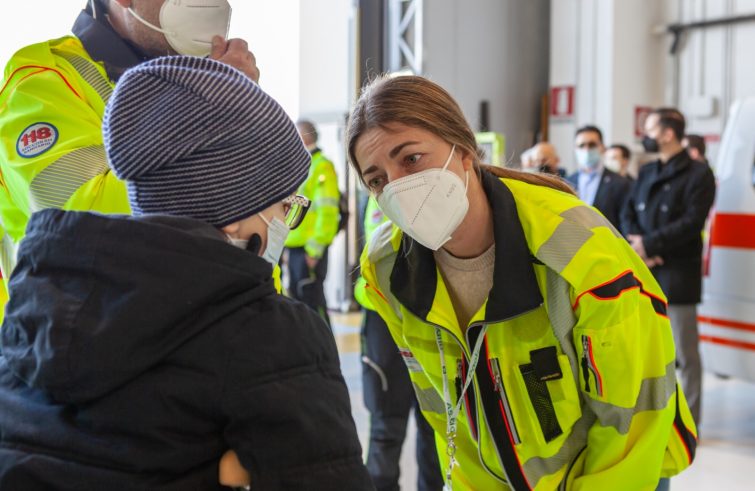 How are the families of children with cancer who have arrived in Italy coping with the situation?
How are the families of children with cancer who have arrived in Italy coping with the situation?
Patients in Ukraine undergo much more treatment than in Italy, so some families feel that the treatment has not started yet.
We had to explain that our national health system does not require payment for treatment. But in Ukraine the public health system requires payment because it cannot cover all the costs, but only 30-40%, the rest is paid for by the patient’s family.
That is why for years Fondazione Soleterre has been ensuring that families do not have to pay anything. We purchase the medicines and medical items and offer psychological support. Not all eighty patients in Italy have arrived through the efforts of Soleterre, some have come on their own: in their desperation, some families with children in hospitals where we are not present have fled to Italy.
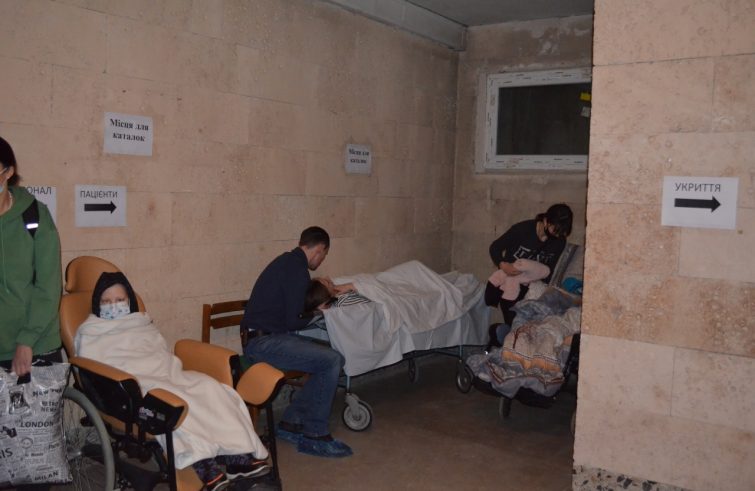 Are there still many young cancer patients in Ukraine?
Are there still many young cancer patients in Ukraine?
We have identified 300 children who are receiving treatment in the country, a further 300 could potentially be evacuated, and we are continuing to look for the others. Some thirty per cent of those 4,000 patients were undergoing screening but have in fact recovered. Some 2,500 to 2,700 children have been discharged, but we are struggling to find them.
We have teams on the ground who are literally looking for them. This is not possible in certain areas of Ukraine. We have also set up our own teams in some of the main centres at the border crossing with Poland, to locate young cancer patients and to track down the largest number of them. Unfortunately, in some areas, like Mariupol, it is impossible to locate them. Sadly, there is a war raging and many of these children will die, because a cancer patient cannot survive without treatment for weeks. Nor is it simple for humanitarian aid workers: it is a very painful search. We have recently learned that the parents of a child who had been hospitalised for two years in Kiev and was housed in our care home were killed in Mariupol. Their child had died of the disease only a few months earlier. Also in Mariupol, where we tried to set up a humanitarian corridor, a convoy with white flags was shot at and the husband of a health ministry official who had been providing us with so much help over the years was killed. He was wearing a white ribbon on his arm and yet he was shot. There is absolutely no security or any form of consideration at the moment.
We have the feeling that people are being shot at with the aim of terrifying the population even more.
Not even finding the children is simple because in most cases the families don’t answer the phone and the volunteers face a high risk of being killed on the streets should they try to look for them themselves.
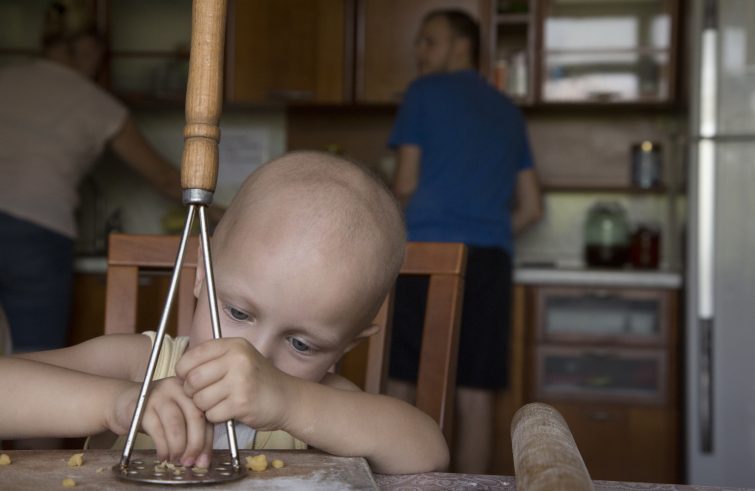 How many people from Soleterre are still present in Ukraine?
How many people from Soleterre are still present in Ukraine?
In Ukraine we have both local and Italian staff, and more will arrive next week to provide some relief and give a helping hand. Now we need to understand which hospitals are still running, we assume no more than five or six. We are helping and equipping all the hospitals – including the smaller ones – that can provide treatment for paediatric cancer patients.
Our intention is to provide treatment wherever it is possible to do so. It is impossible to consider evacuating all children with cancer from Ukraine, but we must keep the hospitals running on site. We continue to supply medicines and personnel. We are evacuating the most serious cases.

